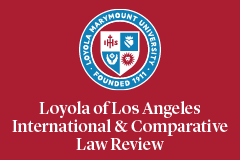Submitting an Article to ILR
T he Loyola of Los Angeles International and Comparative Law Review welcomes and receives submissions from around the world. We receive articles from professors at renowned domestic and international universities, ambassadors and diplomats, practitioners working in and with different countries, and advocates for international human rights.
Submissions are welcomed at any time.
Submission via e-mail would be greatly appreciated (document in WordPerfect or Microsoft Word). We also receive submissions via Scholasticahq.com. Please note we will no longer be accepting submissions through ExpressO as that platform will be closed March 2021. Articles may be mailed to:
Chief Articles Editor
International and Comparative Law Review
Loyola of Los Angeles Law School
919 South Albany Street
Los Angeles, CA 90015-0019
Preferred Format:
- Type-written 8 1/2 inch by 11 inch white paper
- Double-spaced
- Standard font, 12 ppi
- Footnotes in Harvard Bluebook form
- Cover letter with the Author's name, address, phone and/or fax number, email address, and a brief description of the author's background (including education, international exposure and experience, teaching credentials, and other pertinent information).
Review Process
Upon receipt, the Chief Articles Editor will notify the author via email, phone or fax that the article has been received. The author may also contact the Chief Articles Editor to verify whether the article has been received.
The Articles Department then reviews the article in a process that typically lasts three days to two weeks after the date of receipt, depending on the volume of submissions. The editors prefer articles that have a clear legal argument and proper citations. Other factors include general readability and overall organization.
Once a final decision is made, the Chief Articles Editor will notify the author by letter or email. If the article is accepted for publication, then the Chief Articles Editor will ask the author to accept the Review’s offer within the specified time (usually one week). Once the author accepts, the Chief Articles Editor will send a letter to the author explaining the publication process and a licensing agreement to be signed by the author. Part of the preliminary publication process is a preemption check, in which the Chief Articles Editor verifies that the article’s thesis has not been published elsewhere. Upon acceptance by the author, the Review requires the author to withdraw his or her article from consideration by all other publications.
Editing Process
The editing process consists of substantive editing, collecting and verifying sources, and formatting footnotes in Harvard Bluebook form. The author retains the right of final approval of any and all changes.
Substantive Editing: The Review staff and editors read and edit each article for grammar, spelling, punctuation, and sentence structure. The core substance of the article will never be modified. The Review only edits the article for flow and clarity.
Source Collection and Verification: The Review staff and editors must verify every source that the author cites in his or her article. At times, some sources prove very difficult to locate, which is inevitable with particular international documents and sources. In those instances, the Review may ask for the author's assistance in locating or sending a few sources to the Review. The Review pays for all postage and handling.
Formatting Footnotes in Harvard Bluebook Form: The Review staff and editors review footnote citations and make sure that the footnotes follow the Harvard Bluebook form. The Review encourages authors to follow the Harvard Bluebook form. But, if the author is unsure of the format, the Review will reformat the footnotes for the author.
Final approval by the Author: Throughout the editing process, the Primary Articles Editor assigned to the article will regularly update the author on the status of the article, including substantive changes and problems in source verification. If the author strongly disagrees with a substantive change, the Review will typically favor the author's point. The final edited version is sent to the author for his or her final approval. Once the author approves the final version, the article is formatted for publication and sent to our printing company.
The Review sends the author 2 free full volumes and 50 free reprints of his or her individual published article, as compliments of the Review.


